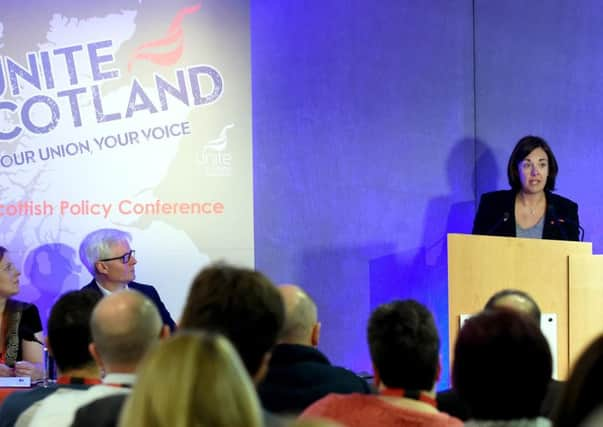Kezia Dugdale calls for £200m a year council debt amnesty


The Scottish Labour leader has urged the Treasury to write off interest payments made by local authorities, arguing that the cash saved could be spent on protecting jobs and services.
The amount paid out by councils each year was described as “quite extraordinary” by Dugdale during a speech at the trade union Unite’s first Scottish Policy Conference. Dugdale said she backed the proposal for an amnesty, which was drawn up by Unite officials and passed by conference delegates yesterday.
Advertisement
Hide AdAdvertisement
Hide AdIn a speech to the gathering at the Golden Jubilee Conference Hotel in Clydebank, Dugdale cited the example of Dundee, where the equivalent of 55 pence in every pound raised through council tax was spent on servicing pre-devolution debt.
According to Unite, Scottish local authorities accumulated a total of £2.5bn of debt before 1998. Interest on the £2.5bn, which is owed to the Public Works Loans Board within the UK Treasury, is paid at between 7 and 8 per cent – the equivalent of between £175 million and £200m.
Referring to Dundee City Council, Dugdale said: “This is a council which has just offered thousands of voluntary redundancies, and scrapping the pre-devo debt could save as much as £36m over the next three years.
“Devolution was to be a fresh start, a new beginning, and yet this historic interest is still a millstone around the neck of councils who are facing Scottish Government cuts.”
After her speech, Dugdale said: “There is a lot old debt that now occupies a tremendous amount of local authority balance sheets.
“In a climate where so many local authority workers’ jobs are at stake, you would expect the Labour Party and the trade union movement to be looking at every possible avenue to try and avoid these cuts. Which is what I am doing.”
When asked if writing off Scottish council debt would be unfair on English councils, Dugdale said: “I have got to put forward the interests of Scotland first and foremost. That’s why I’m in the position today to say that this is a very strong piece of work and is worth examining by the Scottish Government and everyone engaged in trying to avert these cuts.”
Dugdale’s speech also saw the Labour leader address the practice of blacklisting, which sees companies refusing to employ workers for political reasons such as union activity.
Advertisement
Hide AdAdvertisement
Hide AdDugdale announced that Scottish Labour would launch an inquiry into blacklisting if it gets into government after the Scottish election. Labour would create new laws that would require firms to prove that they do not engage in blacklisting before they are given public sector contracts.
Currently, the burden of proof lies with workers who have to prove through their own legal action and tribunals that they were blacklisted.
Dugdale also called on the Scottish Government to back Labour’s attempt to change Holyrood standing orders to enable the parliament to block David Cameron’s Trade Union Bill in Scotland.
The bill’s proposals to undermine those intending to take industrial action have been described by unions as the biggest crackdown on workers’ rights in three decades.